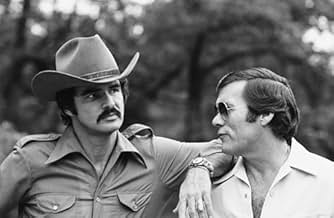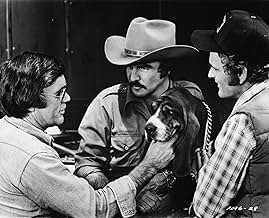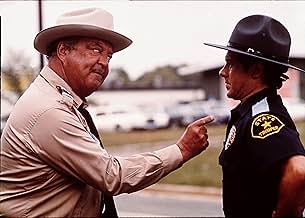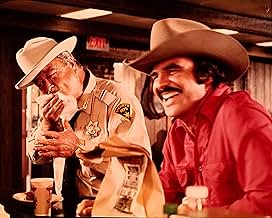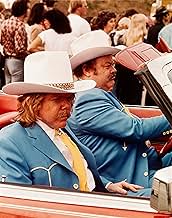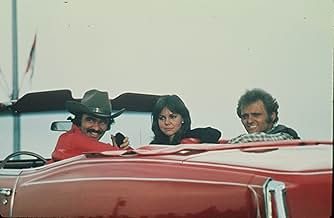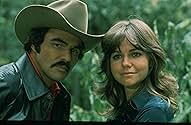Le "Bandit" est embauché pour conduire un semi-remorque rempli de bières au delà des frontières de l'État, avec un shérif à ses trousses.Le "Bandit" est embauché pour conduire un semi-remorque rempli de bières au delà des frontières de l'État, avec un shérif à ses trousses.Le "Bandit" est embauché pour conduire un semi-remorque rempli de bières au delà des frontières de l'État, avec un shérif à ses trousses.
- Réalisation
- Scénario
- Casting principal
- Nommé pour 1 Oscar
- 3 nominations au total
Susie Ewing
- Hot Pants
- (as Susan McIver)
Laura Lizer Sommers
- Little Beaver
- (as Laura Lizer)
Bruce Atkins
- Man Little Enos Pays Off
- (non crédité)
Avis à la une
"Snowman what's your 20, you got your ears on, comeback? We got a Smokey convoy on our tail moving eastbound and down, with the peddle to the metal and the thing to the floor". If any of that makes sense to you it means one of two things. Either you were a young male in the late seventies who dressed in cowboy boots and drove a trans-am... or you have seen the film Smokey and the Bandit.
Smokey sees classically trained thespian Burtrand Reynolds essay the role of the Bandit, a mythical, almost Quixotesque figure, who cuts across the American landscape in a black Pontiac firebird, the ultimate phallic representation of male dominance. The densely layered plot sees Bandit become involved in a quest of Arthurian proportions, attempting to do "what they say can't be done". As it goes, there's a drought in old Atlanta, and the fine townsfolk are gagging for some liquid refreshment for the upcoming monster-truck derby. Luckily, Bandit hears that there's beer in Texarkana, and sets out across country to bring it back... no matter what it takes.
Director Hal Needham, surely an auteur of Hitchcockian proportions, keeps the first act moving along at a steady pace, and there is always close attention paid to characterisation. However, it is in act two that things really get interesting, for no sooner has the Bandit and his ever-faithful slave... sorry, sidekick Snowman loaded up the truck with the brew... than they are set upon by a runaway bride (Sally Field), a fleet of southern law enforcers, and the formidable Sheriff Bufred T. Justice (Jackie Gleason), whose catchphrase "that sun' bitch" proved to be as lastingly funny as a dose of the clap. From this point on tension is cranked to eleven, with more jaw-dropping moments than the entire Indian Jones series combined. Don't believe me, take the scene where Bandit attempts to jump the bridge... if this doesn't have you standing on your seat screaming "go bandit go... yee-haw", then quite frankly nothing will.
Bandit is one no-nonsense jive-talker, an enduring character whose down with the kids (and the blacks), making him one fine example of a true southern gent. We never doubt our hero will fail at his mission, especially not with the benefit of hindsight, since Bandit managed to evade the law and return for the imaginatively titled Smokey and the Bandit II. Here his bounty was an African elephant that, understandably, had the hots for the moustachioed one. Then there was the third instalment, which had a script so bad Reynolds himself turned it down. Here the sh*t-kickers formula was repeated... just without the kick. Smokey and the Bandit is, admittedly, not high art. It's not even low art. But it does represent some kind of period piece, a history lesson, or the pinnacle of late seventies cinema.
Your enjoyment of the film depends on your first viewing experience. If like myself, you were a young boy growing up in the mid-eighties, you will have no doubt lived for the endless thrills, spills, car crashes and second-rate jokes that pepper Bandit, and its two sequels. It's easy to laugh at now, and a young audience will probably be left scratching their heads at the sight of Burt Reynolds mugging uncontrollably to the camera for ninety-minutes whilst Jerry Reed gets to 'sing' his good ol' boy theme tune 'East-bound and Down' for the one-millionth time, but there is a perverse pleasure in seeing bell-bottoms, grown men with CB radios and muscles cars the size of small houses, the likes of which most people won't have seen since 1982. 3/5
Smokey sees classically trained thespian Burtrand Reynolds essay the role of the Bandit, a mythical, almost Quixotesque figure, who cuts across the American landscape in a black Pontiac firebird, the ultimate phallic representation of male dominance. The densely layered plot sees Bandit become involved in a quest of Arthurian proportions, attempting to do "what they say can't be done". As it goes, there's a drought in old Atlanta, and the fine townsfolk are gagging for some liquid refreshment for the upcoming monster-truck derby. Luckily, Bandit hears that there's beer in Texarkana, and sets out across country to bring it back... no matter what it takes.
Director Hal Needham, surely an auteur of Hitchcockian proportions, keeps the first act moving along at a steady pace, and there is always close attention paid to characterisation. However, it is in act two that things really get interesting, for no sooner has the Bandit and his ever-faithful slave... sorry, sidekick Snowman loaded up the truck with the brew... than they are set upon by a runaway bride (Sally Field), a fleet of southern law enforcers, and the formidable Sheriff Bufred T. Justice (Jackie Gleason), whose catchphrase "that sun' bitch" proved to be as lastingly funny as a dose of the clap. From this point on tension is cranked to eleven, with more jaw-dropping moments than the entire Indian Jones series combined. Don't believe me, take the scene where Bandit attempts to jump the bridge... if this doesn't have you standing on your seat screaming "go bandit go... yee-haw", then quite frankly nothing will.
Bandit is one no-nonsense jive-talker, an enduring character whose down with the kids (and the blacks), making him one fine example of a true southern gent. We never doubt our hero will fail at his mission, especially not with the benefit of hindsight, since Bandit managed to evade the law and return for the imaginatively titled Smokey and the Bandit II. Here his bounty was an African elephant that, understandably, had the hots for the moustachioed one. Then there was the third instalment, which had a script so bad Reynolds himself turned it down. Here the sh*t-kickers formula was repeated... just without the kick. Smokey and the Bandit is, admittedly, not high art. It's not even low art. But it does represent some kind of period piece, a history lesson, or the pinnacle of late seventies cinema.
Your enjoyment of the film depends on your first viewing experience. If like myself, you were a young boy growing up in the mid-eighties, you will have no doubt lived for the endless thrills, spills, car crashes and second-rate jokes that pepper Bandit, and its two sequels. It's easy to laugh at now, and a young audience will probably be left scratching their heads at the sight of Burt Reynolds mugging uncontrollably to the camera for ninety-minutes whilst Jerry Reed gets to 'sing' his good ol' boy theme tune 'East-bound and Down' for the one-millionth time, but there is a perverse pleasure in seeing bell-bottoms, grown men with CB radios and muscles cars the size of small houses, the likes of which most people won't have seen since 1982. 3/5
The plot is silly, and the audience gets that from the start as ridiculously dressed tycoon "Big Enos" hires "The Bandit" (Burt Reynolds) to bring back a truckload of Coors beer to Georgia, which was illegal to ship anywhere but regionally at that time. The Bandit enlists his trucker friend Cledus (Jerry Reed) to help him on the endeavor. The trip to Texarkana to get the beer is easy enough. But the trip back is quite harrowing and hilarious. It starts when a runaway bride (Sally Field as Carrie) stops Bandit in the middle of the road in need of a ride. What Bandit does not know is that Carrie walked out on her wedding to the department store mannequin like son (honestly, Cledus' Bassett hound Fred has more personality) of Sheriff Buford T. Justice (Jackie Gleason). So Bandit thinks he is being pursued across country because of his speeding and reckless driving, maybe because of the beer, but never does it occur to him the sheriff is after his new passenger.
This is just a delightful road picture made authentic looking with tons of anonymous extras playing truckers, ladies of the evening, workers and customers at roadside diners, and teens just looking to do some mischief while listening in on their CB radios. There are also some great songs and Jerry Reed's musical talents are not wasted. About the CB radios - they were a fad in the mid 70s made that way by a 1975 hit entitled "Convoy", and they were the only way to communicate to other drivers on the road in the 1970s. There would not be an internet in common use for another 20 years and cell phones would not be ubiquitous for another 30.
So be prepared to be transported back to a simpler time when there were not tiny cameras tied to cell phones everywhere, air bags did not exist, gas mileage was not an issue, and the era of "zero tolerance" had not occurred yet. Oh, and the role of profane but persistent Buford T. Justice started a bit of a film acting renaissance for Jackie Gleason, who had always had a presence on TV but had been absent from the big screen awhile.
This is just a delightful road picture made authentic looking with tons of anonymous extras playing truckers, ladies of the evening, workers and customers at roadside diners, and teens just looking to do some mischief while listening in on their CB radios. There are also some great songs and Jerry Reed's musical talents are not wasted. About the CB radios - they were a fad in the mid 70s made that way by a 1975 hit entitled "Convoy", and they were the only way to communicate to other drivers on the road in the 1970s. There would not be an internet in common use for another 20 years and cell phones would not be ubiquitous for another 30.
So be prepared to be transported back to a simpler time when there were not tiny cameras tied to cell phones everywhere, air bags did not exist, gas mileage was not an issue, and the era of "zero tolerance" had not occurred yet. Oh, and the role of profane but persistent Buford T. Justice started a bit of a film acting renaissance for Jackie Gleason, who had always had a presence on TV but had been absent from the big screen awhile.
"Smokey and the Bandit" may be Burt Reynolds' best movie. At least it's certainly one of his most memorable. In it, he plays good ol' boy the Bandit, the classic speed demon outlaw, driving flat out through five states and back on one wild and crazy beer run. This movie has lots of laughs and action. It also offers a look into the culture of CB radio, which was a huge craze of the day. And who could forget the Great One, Jackie Gleason's hilarious portrayal of Sheriff Buford T. Justice, the bombastic, persistent lawman from Texas. "Smokey" will always be a comedy classic, and that's a big 10-4!
This movie,as far as I know,never won any special honors.It perhaps is not listed as one of the top 1,000,000 movies of all time.It may not be considered by many to be a great film,but I (and I am not ashamed to admit this),love this movie.Perhaps it is the charm exuded by Burt Reynolds and Jerry Reed.Perhaps it is the beautiful Sally Field(she never looked better on film).Perhaps it is the comic genius of Jackie Gleason.Perhaps it is all these things rolled into one.This is the absolute "king" of redneck comedy movies(and I use the term "redneck" with the utmost affection).I am a fan of great films,but I have my guilty pleasure movies as anyone has. This one tops my list of those.Love it!
I've never been much of a fan of Burt Reynolds fan, but he happens to star in many 70's and early 80's movies that are right up my alley. We're talking about movies with charismatic macho man protagonists, fast cars, trucks so large they seem to be overcompensating for something else, infantile comedy and flamboyant action stunts. Movies like "White Lightning", "Hooper", The Cannonball Run", "Sharky's Machine", "Gator" and of course the "Smokey and the Bandit" trilogy and I can't help the fact they all star Burt Reynolds. "Smokey and the Bandit" is basically a very simplistic story and approximately three quarters of the film seems improvised at the spot, but a premise like this just can't fail. Two Texan big shots hire the notorious trucker Bandit to illegally transport a lorry of Coors Beer from Texarkana to Georgia in barely 28 hours. Bandit develops a nifty plan where his buddy Snowman drives the beer truck and he drives a Trans-Am in front to divert the attention of the coppers. During the wild and time-pressured ride, Bandit picks up the hyperactive runaway bride Carrie and becomes involved in a testosterone showdown with the fearsome Texan Sheriff Buford T. Justice. You easily forgive "Smokey and the Bandit" for its lack of originality and ideas, simply because everyone involved in the film seems to be so very enthusiast and cheerful. Former stuntman Hal Needham delivers a fast- paced script and taut direction (his other film "MegaForce", on the other hand is a terribly boring turkey) whilst all his cast members are having the time of their lives. Jerry Reed is excellent as the lesser cool sidekick Snowman and he also provides the film with a sublimely irresistible hillbilly soundtrack, including the fantastically catchy songs "East Bound and Down" and "The Legend". Sally Field and Burt Reynolds definitely have on-screen chemistry, but the show is undeniably stolen by Jackie Gleason as the persistent and downright obsessive Sheriff Buford T. Justice. Heck, even his character's name alone is awesome to write and pronounce repeatedly! He has the best lines, allegedly a large part of them were ad-libbed, like when he says to his slow and unintelligent son: "the first thing I'm going to do when we get home, is punch your mother in the face" (referring that the son can't possibly have inherited his stupidity from him).
Le saviez-vous
- AnecdotesHal Needham asked Jerry Reed to write a theme song for the film. A couple of hours later, Reed presented "East Bound and Down" to Needham. With an acoustic guitar, Reed started to play it and Needham immediately stopped him. Thinking Needham didn't like it, Reed offered to re-write the song. To which Needham replied: "If you change one note, I'll kill you!" The song went on to become one of Reed's biggest hits.
- GaffesWhen the police car at the road block is knocked off the embankment, the car seen rolling down towards the river is a late-'60s Ford Galaxy, but when it comes to rest at the bottom, it is a Plymouth Fury.
- Citations
Buford T. Justice: [to his son] There's no way, *no* way, that you came from *my* loins. Soon as I get home, first thing I'm gonna do is punch yo' momma in da mouth!
- Versions alternativesThe TV print needed extensive overdubbing to reduce the amount of profanity. In particular, Jackie Gleason's expression "Sum-bitch!" was replaced with "Scum-bum." This new word became a popular catch phrase with kids after the film made its TV debut.
- ConnexionsFeatured in L'univers du rire (1982)
Meilleurs choix
Connectez-vous pour évaluer et suivre la liste de favoris afin de recevoir des recommandations personnalisées
Détails
- Date de sortie
- Pays d’origine
- Sites officiels
- Langue
- Aussi connu sous le nom de
- 2 pícaros con suerte
- Lieux de tournage
- Sociétés de production
- Voir plus de crédits d'entreprise sur IMDbPro
Box-office
- Budget
- 4 300 000 $US (estimé)
- Montant brut aux États-Unis et au Canada
- 126 737 428 $US
- Montant brut mondial
- 126 750 426 $US
- Durée1 heure 36 minutes
- Couleur
- Mixage
- Rapport de forme
- 1.85 : 1
Contribuer à cette page
Suggérer une modification ou ajouter du contenu manquant


